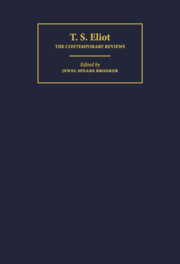Book contents
- Frontmatter
- Contents
- Series Editor's Preface
- Introduction
- Acknowledgments
- Prufrock and Other Observations (1917)
- Poems (1919); Ara Vos Prec (1920); Poems (1920)
- The Sacred Wood: Essays on Poetry and Criticism (1920, 1921)
- The Waste Land (1922)
- Homage to John Dryden (1924)
- Poems 1909–1925 (1925)
- For Lancelot Andrewes: Essays on Style and Order (1928, 1929)
- Dante (1929); Animula (1929); Marina (1930)
- Ash-Wednesday (1930)
- Selected Essays 1917–1932 (1932)
- Sweeney Agonistes (1932)
- The Use of Poetry and the Use of Criticism (1933)
- After Strange Gods: A Primer of Modern Heresy (1934)
- The Rock (1934)
- Murder in the Cathedral (1935)
- Collected Poems 1909–1935 (1936)
- The Family Reunion (1939)
- The Idea of a Christian Society (1939)
- East Coker (1940); Burnt Norton (1941); The Dry Salvages (1941); Little Gidding (1942); Four Quartets (1943)
- Notes Towards the Definition of Culture (1948, 1949)
- The Cocktail Party (1949, 1950)
- The Confidential Clerk (1954)
- The Elder Statesman (1959)
- Index
The Cocktail Party (1949, 1950)
Published online by Cambridge University Press: 10 March 2010
- Frontmatter
- Contents
- Series Editor's Preface
- Introduction
- Acknowledgments
- Prufrock and Other Observations (1917)
- Poems (1919); Ara Vos Prec (1920); Poems (1920)
- The Sacred Wood: Essays on Poetry and Criticism (1920, 1921)
- The Waste Land (1922)
- Homage to John Dryden (1924)
- Poems 1909–1925 (1925)
- For Lancelot Andrewes: Essays on Style and Order (1928, 1929)
- Dante (1929); Animula (1929); Marina (1930)
- Ash-Wednesday (1930)
- Selected Essays 1917–1932 (1932)
- Sweeney Agonistes (1932)
- The Use of Poetry and the Use of Criticism (1933)
- After Strange Gods: A Primer of Modern Heresy (1934)
- The Rock (1934)
- Murder in the Cathedral (1935)
- Collected Poems 1909–1935 (1936)
- The Family Reunion (1939)
- The Idea of a Christian Society (1939)
- East Coker (1940); Burnt Norton (1941); The Dry Salvages (1941); Little Gidding (1942); Four Quartets (1943)
- Notes Towards the Definition of Culture (1948, 1949)
- The Cocktail Party (1949, 1950)
- The Confidential Clerk (1954)
- The Elder Statesman (1959)
- Index
Summary
*Desmond Shaw-Taylor.
"The Edinburgh
Festival—I."
New Statesman 38
(3 September 1949), 243.
[ … ]
The Cocktail Party, unlike Mr. Eliot's two earlier plays, is on the surface a specimen of contemporary dramatic style, as it is understood in Shaftesbury Avenue. The curtain rises on the usual stylish flat, with a white telephone, a Marie Laurencin, and a group of rather exasperated people determined to make the party go. The host, we begin to perceive, is also anxious to make the party go—in another sense; but when at last they depart, he persuades one of them to stay, a stranger to whom he can blurt out the embarrassing truth which he has tried to conceal from the rest: his wife has left him, and the guests we have seen are merely those who couldn't be reached and put off. A first-rate situation, and what follows is better still. The hitherto obscure and taciturn guest comes to life with a bang, takes command of the situation, and pours out a stream of sardonic and paradoxical home-truths to the egotistical husband; finally, […] he bursts into song. The spirit of early Shaw hovers deliciously in the air; the wit sparkles and we begin to feel pleasantly sure that everything will be turned inside out and upside down in the second act.
So it is. The obscure guest is revealed as the eminent Sir Henry Harcourt-Reilly, of Harley Street; the two most tiresome of the guests turn out to be his assistants, almost his spies.
- Type
- Chapter
- Information
- T. S. EliotThe Contemporary Reviews, pp. 515 - 544Publisher: Cambridge University PressPrint publication year: 2004



